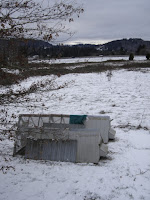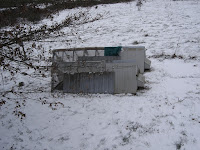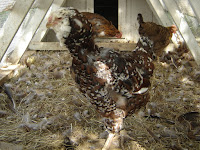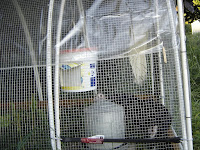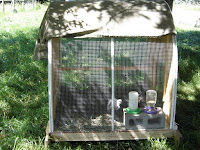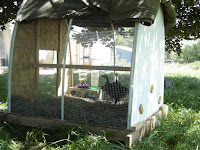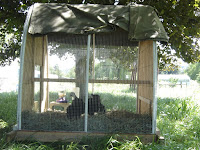We received snow on a really cold day. The clucks are NOT happy with this. The cold is no big deal, but the snow was distressing for them. I had to throw hay on top of the snow so that they would come out to eat and drink. However, they were not convinced this was good, so I had to entice them with a scoop of cracked corn. We have the water warmer under each water fountain for them so that they don't have to deal with icy water. After seeing the cracked corn on a little paper plate, they ventured onto the hay and are getting nourished and, perhaps, a little exercise too. The snow is super dry powder and with the wind that we had, a lot of the snow drifted. Here are a few pix of what little bit of snow that we have for the day and the chickens finally coming out of the coops.
A bit of McCackle as I update what I learn and discover while trying to raise chickens and garden.
Thursday, December 15, 2016
Friday, November 25, 2016
Turkey Day
The Turkeys were 9.5 pounds and 12.6 pounds in preparation for dinner. So they were about averaged size for their breed. The meat was very tender and fresh. Not at all stringy or tough. All in all, it was a success and we will have plenty of meat to last for the week for leftovers, thanks to sweet Luna and Aries.
Monday, November 14, 2016
Layers and Turkeys
We have concluded the the two turkeys are both hens. I thought they were toms, but as the weather got cooler, they developed feathers on their heads and the snood never got any longer. So we are assuming that they are not going to get much larger. Regardless, and we have fattened them to prepare for the fateful day.
The Orloffs have started to lay again. When the standard time went back into effect, we put the lights back into the coop to light up at 4:00 in the morning. The Orloffs are back to laying, but it is sparse at this point. Only one egg every other day, this week. The "layoff" lasted fabout 10 weeks. Little by little.
Labels:
Eggs,
Russian Orloff,
Turkeys,
Winter Prep
Saturday, October 1, 2016
Welsummers' First Year Molt
The Welsummers first molt began about 10 days ago, and the one Orloff that is with them, is in her refeather mode. One of the Welsummers is not yet in full molt, but the other two look a little like porcipines. Their pen is a be-feathered spectacle.
Labels:
Molting,
Pasture,
Russian Orloff,
Welsummer
Thursday, September 29, 2016
Black Spanish Turkeys at Twenty Three (Weeks)
At five months, the turkeys appear to both be toms and so, they are Tom Luna and Tom Aries, and plumping up nicely. They love their cracked corn! Looking back at how tiny they were when we brought them home the first week.We certainly can't hold them in the palm of our hands anymore!
Labels:
Black Spanish,
Turkeys
Saturday, September 24, 2016
The First Welsummer Molt
The Welsummers stopped egg production this week and have settled into their first molting season. Time to freeze up the older eggs for use later over the next month or we will be purchasing eggs again this year, which we did NOT like doing last year. We have no new pullets becoming new layers, so there will definitely be a production lapse again this year.
The problem that we encountered last year was the fact that the Welsummers were so slow in their laying maturity, that it caused us to cool our heels. Also, if I remember correctly, the Orloffs went into the molt earlier season last year which seems to last longer, but I could be wrong. Regardless, we need to be more prepared, not sell the few remaining dozens that we have, and freeze the older eggs so that we have a back up eggs to tap into next month.
When I start freezing them, I will try to remember to take some photos of the process.
Labels:
Farm Fresh Eggs,
Molting,
Welsummer
Sunday, September 11, 2016
The Blending Experiment Failed
The combining of the Orloffs failed. The three Orloffs were pretty cruel to the one transitioning Orloff. They made her sleep on the floor at night, or in the nesting box. She spent most of her day in the nestbox to try to protect what feathers she had left. The brutes were picking all the feathers out of her back and neck.
The humane solution was to put her back in with the Welsummers, who were all too pleased to have her back. The Welsummers truly missed her as their "dominant" hen. So, yah, that attempt to combine the remaining Orloffs was not successful.
The humane solution was to put her back in with the Welsummers, who were all too pleased to have her back. The Welsummers truly missed her as their "dominant" hen. So, yah, that attempt to combine the remaining Orloffs was not successful.
The Wellsummers are starting to molt, as well. The egg production has slowed down to one per day from that pen. It will be interesting to see how the Welsummers molt since we have never experienced the molting season with them. They are starting to look pretty scraggly, but not anything, yet, as scraggly as the Orloffs look
We were talking about transitioning out of the Orloffs this next spring to raise meat birds along with just a few Welsummers. A small flock of four or five would probably be perfect for our needs. The Orloffs are too easily stressed out with the rains and heat. While they do fine with the really cold temps, the Welsummers also do fine with the type of winters that we have. We may just get a couple of new Welsummers next spring, and thin out the aging Orloffs that have slowed down on their egg production.
Labels:
Farm Fresh Eggs,
Molting,
Nesting Box,
Russian Orloff,
Welsummer,
Winter Prep
Sunday, September 4, 2016
Gardening Adventures 2016
This year's garden was definitely different from last year.
Things tried and failed:
Things that worked:
Things that need to be addressed for next year:
Slug control needs improvement.
Garden pest panels that we can easily set up and take down to protect from birds, bunnies and mice.
Green house starts were hit and miss. Some plants need to be planted outside, like peas, beans, basil, parsley (herbs in general) and spinach. Others that worked were some lettuce, dill, and bell peppers. Coconut fibre pots were expensive and basically not the best choice of starting pots.
Potatoes need more consistent soil addition, at least once per week to help promote better potato growth, but all in all, our potato production this year, despite the rains, was pretty good. By June, adding more soil was useless, except to protect the potatoes from the sun/heat.
Things tried and failed:
- Blueberries - rotted on the stems during the rains
- Planting some of the seeds in the coconut fibre pots (basil, spinach, parsley, peas and bell peppers)
- Onions developed a disease that made them mushy and useless.
- Onion seeds planted last fall did not make it through the winter.
- Planting second corn mid-June was not successful. Corn in second planting never matured.
- Green beans were a bust this year.
- Problems this year with getting tomatoes to actually set on the vines (weather issues)
- Bell Peppers are unusually small this year!
- Strawberries tended to mold in the soil from all the rain and humidity in the air.
Things that worked:
- Garlic planted last fall thrived and matured by July.
- Planting lettuce and dill in the coconut fibre pots.
- Planting spinach seed directly in garden soil in early March was a huge success.
- Starting bell peppers in the green house was successful, but should have been started in February.
- Planting first corn mid-May was very successful.
- Corn was GREAT by August from first planting.
- Planting peas in five gallon pots in March and April was very successful.
- Planting lettuce in garden soil by the end of March was very successful.
- Carrots were GREAT!
- Potatoes were GREAT! Need to start them by mid February to expand on the growing season but be careful with freezing temps until mid March. Red potatoes did best this year.
- Oregano did GREAT this year. Needs to be thinned this fall for next year.
- Dill plants did great.
Things that need to be addressed for next year:
Slug control needs improvement.
Garden pest panels that we can easily set up and take down to protect from birds, bunnies and mice.
Green house starts were hit and miss. Some plants need to be planted outside, like peas, beans, basil, parsley (herbs in general) and spinach. Others that worked were some lettuce, dill, and bell peppers. Coconut fibre pots were expensive and basically not the best choice of starting pots.
Potatoes need more consistent soil addition, at least once per week to help promote better potato growth, but all in all, our potato production this year, despite the rains, was pretty good. By June, adding more soil was useless, except to protect the potatoes from the sun/heat.
Friday, September 2, 2016
Orloffs are Molting Again, Right on Time
This is the second annual molting season (or is that moulting) for our four remaining Orloffs. D felt this would be a good time to take the lead Orloff from the Welsummer's pen and add her to the Orloff pen. Um, I'm not so sure this is a good idea. But, since they are already stressed, who knows? It might be the perfect time. She is definitely is fiesty and may be able to dominate in the end. Yet, she is also a very friendly hen, so, she may not be able to win out with the transition. We are adding probiotics to their water to help their immune system and we will watch to see how they fare.
The hen keeps calling to the Welsummers and they to her. It's quite interesting. After a few attacks between her and the other Orloffs, she seems to be ruling the pen dominance, but that may not last as they wear her down. It would be one thing if we had pulled the others into her territory where she feels the dominance, and moved the Welsummers to the other pen/coop. But that would have been considerably more work and efforts. This will be an interesting experiment.
The Welsummers are not yet molting, and producing plenty of nice eggs. So this should reduce the burden of the eggless time period.
Labels:
Coop,
Molting,
Pen,
Russian Orloff,
Welsummer
Saturday, August 27, 2016
Aries Turkey Inferno
The poor turkeys were almost fricassee as a fire raged in the pasture. Thankfully, neighbors immediately came to help and shortly after that multiple fire trucks and fire fighters arrived on the scene.
After the turkeys were released from their pen/coop, they flew to safety while a couple of fire trucks were navigated into the pasture and hoses were stretched across the road into the neighborhood up the street. This necessitated the police blocking the streets to protect the hoses! Santa Vaca!
Thankfully, not too much was burned but the smell is intense. The door on the pen is a little melted, but still, all in all, the coop and pen are intact and functional. The turkeys were a little traumatized, and rounding them up took some efforts. They had found the neighbor's apple tree and decided that was a perfect location to chill while those crazed men and women worked to put out that fire.
What started the fire? Well, the week was an especially hot one, turning the pasture into prime tinder. The electric fencing sparked the fire. We so totally appreciate our local fire fighters for saving our pasture and our home! Also, our kind neighbors were very helpful in the early minutes of fire.
The turkey coop has been moved to a new location and the electric fencing has been taken down. Oy! What a nightmare this could have been! On the positive side, it did burn up a good section of blackberries.
Labels:
Apples,
Black Spanish,
Coop,
Electric Netting Fence,
Pasture,
Turkeys
Tuesday, August 2, 2016
Bigger Turkeys Need more Space
The turkeys are about 15 weeks old now. They sure do grow quickly!
This week, we worked on setting up an electric netting area for the turkeys. They are leery of it, and, they can fly over if they choose, but have not in the past few days. There's plenty of grass, seeds and weeds for them to forage at this point. We need to get some better mid supports for the fencing. The stretches are about 13' so the sections can get pretty saggy without mid supports. Right now, we are using fiberglass supports to hold up the fencing. So, for now, the two turkeys have approximately 40'x40' protected grazing area to keep dogs, cats and coyotes out.
Labels:
Black Spanish,
Electric Netting Fence,
Pasture,
Pen,
Turkeys
Monday, July 4, 2016
PVC Turkey Pen
Between the three of us, the pen is finally complete. It is five feet wide and ten feet long. The only wood is the base of pressure treated 2X4s. The archs are ten foot 1/2 inch PVC with 1/2 inch mesh hardware cloth. We attempted to replicate the arch for the end as a door, but it did not work well. So we filled in a section in order to attach a vertical post and attach a rectangle door over the end. We used a lot of zipties to attach the wire to the PVC while stapling the wired on the outside of the wood frame.
In an effort to reduce sway, you may see a few "right angles" of PVC attached to the center next to the arch. One of the right angles is also where we have hung their rain-proof feeder for easier access to feed them.
These two are great foragers and within an hour of putting the pen into place, they had the vegetation mowed down!
The shiny "cover" over the pen is just a clear table cloth for those rainy days our area is renowned for. The pen is considerably lighter than our eight foot by four foot pens built out of 2X3s!
If we ever decide to combine our two chicken flocks, the coop and pen together are big enough for all our chickens. Or, we can just keep it set aside for raising a couple of turkeys each summer.
Labels:
Black Spanish,
Coop,
Gravity chicken feeder,
Pasture,
Pasture Paddocks
Saturday, June 4, 2016
Fun with Luna and Aries
So, now that the couple are in the coop, I tried to snap a few updates through the wire. The mesh causes some weird blur at times, but we'll work with it. Plus, I don't have the setting on the fastest speed because I'm in the shade with the coop. Here we go at Seven Weeks of Age.
Luna
|
Aries
|
Luna near Aries far
|
Aries Reaching the bar
|
Luna in a Preen
|
Luna looking through the glass door
|
Aries New seven-week Feathers coming in
| |
Labels:
Black Spanish,
Coop,
Turkeys
Seven Weeks Black Spanish Turkeys Are Outside! New Coop Design
It is hot hot today, but thankfully, the new coop allows for great air flow! The Coop is finally done. It is not tooo heavy, but I think it will be solid enough for Aries and Luna. I will still need to paint it. It's only a primer right now. But you can see that the Poults are over a foot tall now and growing rapidly. They are just starting to get feathers developing on the backs of their necks. A canvas tarp will protect them in the evenings and on rainy days. I will need to start on their run now. It will be similar in style, but setting on the ground to allow them to forage safely. Heritage turkeys are supposed to be great foragers. As they get older/bigger, we will let them out of the pen and forage in the field.
The Start - a base on sleds
|
The front with sliding plexi-glass door
|
Luna Checking the new Coop Digs
|
Aries standing under Roosting Bar
|
Still using small feeder/water until they get larger
|
Back wall with Clean out door
|
The door panel is secured to Wood on front wall
|
Canvas Tarp will be secured with bungie cords
|
Roost is a 2" x 3" bar attached to Front and Back Panels
| |
Labels:
Black Spanish,
Coop,
Gravity chicken feeder,
Poults,
Straw,
Turkeys,
Water
Subscribe to:
Comments (Atom)






